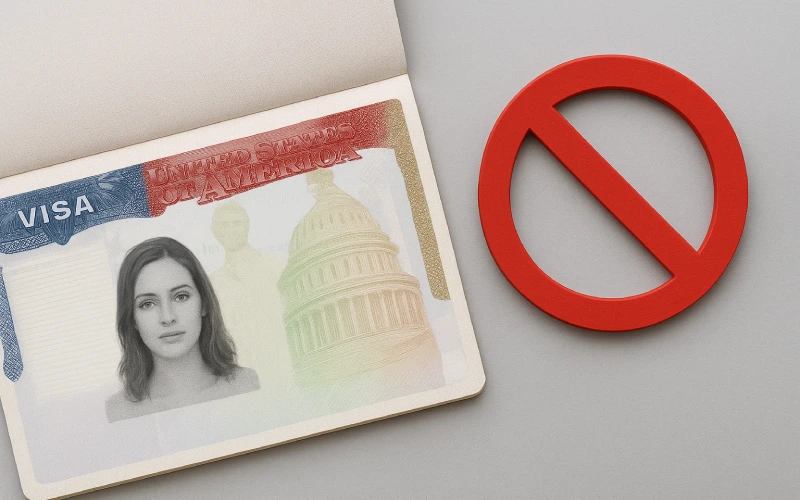On your way to the United States? Whether you are joining a uni or ticking another country off your bucket list, make sure you abide by the local rules. You have packed the bags, got your visa, and are waiting for the flight — all sorted. But, here is the catch: what you do after entering the country is just as important. One of the most common mistakes travelers make is US visa overstay.
At first glance, staying a few extra days may not seem like a big deal. After all, what difference can 72 hours make? But in U.S. immigration law, it can. If you stay beyond your visa validity, it can lead to entry bans, visa denials, and even prevent you from getting a Green Card in the future.
Keep reading to know what the US visa overstay means with the penalties you could face, and smart ways to make sure you never cross that line.


How do these US visa penalties work? If immigration authorities discover you have overstayed while you’re still in the U.S., you may be put under scrutiny and sent back to your home country.
An overstay often cancels your current visa automatically. This means if you apply for future applications, be it for different visa types, it might be disproved.
If you are thinking that you’ve overstayed but you can now switch to another visa for extension, it is not the case. As you overstay the present visa, you cannot do this without first leaving the country.
 ◍ Impact on Green Card or Citizenship Applications
One of the major out-turns of the overstays is that it gets harder to apply for a Green Card or U.S. citizenship. Even if you qualify under certain categories—like marriage to a US citizen—the overstay can delay or complicate the process.
◍ Impact on Green Card or Citizenship Applications
One of the major out-turns of the overstays is that it gets harder to apply for a Green Card or U.S. citizenship. Even if you qualify under certain categories—like marriage to a US citizen—the overstay can delay or complicate the process.
What is US Visa Overstay?
A visa overstay happens when you remain in the United States beyond the period authorized by U.S. Customs and Border Protection (CBP). The important detail here is that your stay period is based on your I-94 Arrival/Departure Record—not the expiration date on your visa sticker. Example: If your visa expires in December but your I-94 says you must leave by September, staying past September means you’re overstaying—even if the visa itself looks valid.
Common Reasons for Overstaying
How does someone end up overstaying their U.S. visa? Is it really that easy to ignore the dates? In many cases, it’s not about ignoring them—it’s about misunderstanding the rules or facing unexpected life events. Here are the most common scenes that trap travelers:- Confusion between visa expiry and I-94 date Many travelers know their visa expiry date is the deadline for leaving the U.S. However, the visa gives you the consent to enter; your authorized stay is approved by your I-94 Arrival/Departure Record. If your I-94 says you must leave by September but your visa expires in December, you must still exit in September.
- Flight delays or cancellations It is quite possible that your flight is delayed, which could be due to terrible weather, airline strikes, or unavoidable travel traffic. In this case, if your flight is scheduled for another date and it falls after your legal stay date, you overstay—even if it’s only by a day or two. You might think that immigration can waive this, but not on their own. You have to take steps to explain and document the delay.
- Medical emergencies This is another genuine reason that people overstay. Illness or injury is inevitable. Whether your own or a family member’s has fallen sick and forced you to remain in the U.S. past your allowed date, you can request an add-on for medical reasons; many fail to apply in time.
- Pending applications People sometimes remain in the U.S. while waiting for job offers, uni admission results, or immigration approvals. If the application is still undecided and pending but your stay has reached the last date, you’re overstaying unless you’ve filed a proper extension request.
- Personal relationships Who can skip the major life events? Well, we all wait for it — like a friend’s wedding, child birth, or spending quality time with a partner — and these events can tempt travelers to extend their stay. While the reason may be personal and earnest, immigration law doesn’t make exceptions for such cases without prior approval.
US Visa Overstay Rules and Duration Limits
Each visa category has its maximum stay period that you must know. Here is the category-wise validity:- Tourist Visa (B1/B2): Up to 6 months
- Student Visa (F-1/M-1): Duration of the course with any grace period
- Work Visa (H-1B, L-1, etc.): Length of job contract or as stated on your I-94
Penalties and Consequences of US Visa Overstay
If you are in the US after the date written on your I-94, your unlawful stay can lead to an entry ban in the future. This ban is applicable for a period of 3 years, 10 years, or permanently. This could vary as: if you stay more than 180 days but less than 1 year, it could lead to a 3-year ban. If you are in the US for a year or more, this is a 10-year ban, while if you indulge in severe violations, such as fraud, false documents, this could be a possible permanent ban.
➤ Deportation Risk
How do these US visa penalties work? If immigration authorities discover you have overstayed while you’re still in the U.S., you may be put under scrutiny and sent back to your home country.
➤ Visa Cancellation and Denials
An overstay often cancels your current visa automatically. This means if you apply for future applications, be it for different visa types, it might be disproved.
➤ Ineligibility for Change of Status or Extensions
If you are thinking that you’ve overstayed but you can now switch to another visa for extension, it is not the case. As you overstay the present visa, you cannot do this without first leaving the country.
Fines and Legal Consequences of Overstaying a US Visa
Since you have got to know about the bans and deportations, what are the US visa fines that come with a US visa overstay? ◍ Is There a Fine for Overstaying in the US? In most cases, the U.S. doesn’t impose direct monetary fines for overstays. Instead, the penalty, or the fine comes through bans, cancelled visas, and scrupulous audits on future applications. ◍ Impact on Green Card or Citizenship Applications
One of the major out-turns of the overstays is that it gets harder to apply for a Green Card or U.S. citizenship. Even if you qualify under certain categories—like marriage to a US citizen—the overstay can delay or complicate the process.
◍ Impact on Green Card or Citizenship Applications
One of the major out-turns of the overstays is that it gets harder to apply for a Green Card or U.S. citizenship. Even if you qualify under certain categories—like marriage to a US citizen—the overstay can delay or complicate the process.
How to Avoid Overstaying Your US Visa
Follow the ideas given below and you can easily escape the US visa overstays:- Know Your Visa Expiry and I-94 Date
- Plan Your Exit or Extension in Advance
- Set Reminders and Use Travel Apps
What to Do If You Have Already Overstayed
We have discussed all possible reasons, penalties and fines regarding the US overstays, but what if you have already fallen into the pit? Here is what to do next:- Steps to Take Immediately: Leave the US as soon as possible to limit the length of unlawful stay. The sooner you leave, the lesser the damage.
- Consult an Immigration Attorney: A lawyer specializing in US immigration can review your case and suggest the best path forward.
- Apply for a waiver: In cases of emergencies, such as medical issues, there might be a waiver possibility, but these are rare and not guaranteed.
FAQ's About US Visa Overstay
1. Can you re-enter the US after overstaying?
Yes, but only after completing your ban period unless granted a waiver.
2. Does overstay affect other visa applications?
Yes, it can affect future US and even non-US visa applications.
3. How long is the ban for overstaying?
US visa ban overstay can vary from 1 year, 3 years, to permanent.
4. Is overstaying a US visa a crime?
It’s a civil violation, but it can still lead to removal from the country.
5. How long can I stay in the US after my visa expires?
You must leave by your I-94 date—not the visa expiry date.
6. Are there any fines for overstaying a US visa?
Not in cash, but the penalties are severe in terms of future travel rights.
7. Can I apply for a Green Card after overstaying a US visa?
Sometimes, especially if you’re an immediate relative of a U.S. citizen, but rules are strict.
8. What is the 3-year and 10-year re-entry ban?
It bars from re-entering the U.S. for the specified period based on the overstay length.
9. How can I check my US visa overstay status?
Check your I-94 online or request information from CBP.
10. Can I fix an overstay on my US visa?
You can’t erase it, but legal assistance can help reduce its long-term impact.
Conclusion
So, keep the immigration tracking apps with you and stay updated with policies. They keep you aware of your departure deadlines and help avoid costly mistakes.
